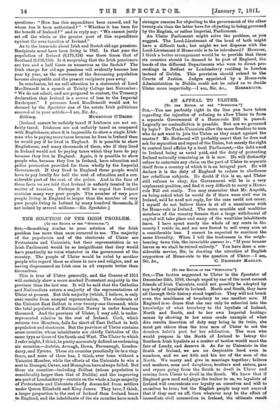THE SOLUTION OF THE IRISH PROBT,RM.
lTo MN EDITOR. Or TEM " SPECTATOIL"] Sass—Something similar to your solution of the Irish problem has more than once occurred to me. The majority of the population and of the electorate of Ulster are Protestants and Unionists, but their representation in an Irish Parliament would be so insignificant that they would have practically no voice whatever in the government of the country. The people of Ulster would be ruled by another people who regard them as aliens in race and religion, and as having dispossessed an Irish race in all respects better than themselves.
This is true of Ulster generally, and the Census of 1911 will certainly show a more marked Protestant majority in the province than the last one. It will be said that the Catholics and Nationalists return a majority of the representatives of Ulster at present. But this majority (which, I believe, is only one) results from unequal representation. The electorate of the Unionist East Belfast is over twenty-one thousand, while the total population of Nationalist Newry is under fourteen thousand. And the province of Ulster, I may add, is under- represented relative to the rest of Ireland. Cork, which returns two Members, falls far short of East Belfast in both population and electorate. Bat the province of Ulster contains some counties whose inhabitants are chiefly Catholics of the same type as those of the South and West. The Ulster to which I refer might, I think, be pretty accurately defined as embracing six counties,—Antrim, Armagh, Down, Fermanagh, London- derry, and Tyrone. These six counties practically lie in a ring- fence, and none of them has, I think, ever been without a Unionist Member, while the efforts of the Unionists to win a seat in Donegal, Cavan, and Monaghan have always failed. But these six counties—including Belfast (whose population is considerably larger than that of Dublin) and the improving sea-port of Londonderry—contain on the whole a large majority of Protestants and Unionists chiefly descended from settlers under Queen Elizabeth and King James: They bear, I think, a larger proportion to the rest of Ireland than Ireland bears to England, and the inhabitants of the six counties have much
stronger reasons for objecting to the government of the other twenty-six than the latter have for objecting to being governed by the English, or rather Imperial, Parliament.
An Ulster Parliament might solve the problem, as you suggest. The Lord-Lieutenant of the head of both might have a difficult task; but might we not dispense with the Lord-Lieutenant if Home-rule is to be introduced? However, I think a better arrangement would be to provide that these six counties should be deemed to be part of 'England, the heads of the different Departments who were to direct pro- ceedings in Belfast or Londonderry residing in London instead of Dublin. This provision should extend to the Courts of Justice. Judges appointed by a Home-rule Administration in Dublin could not be relied on to decide
Ulster cases impartially.—I am, Sir, &c., HIBRIMICUS.


















































 Previous page
Previous page